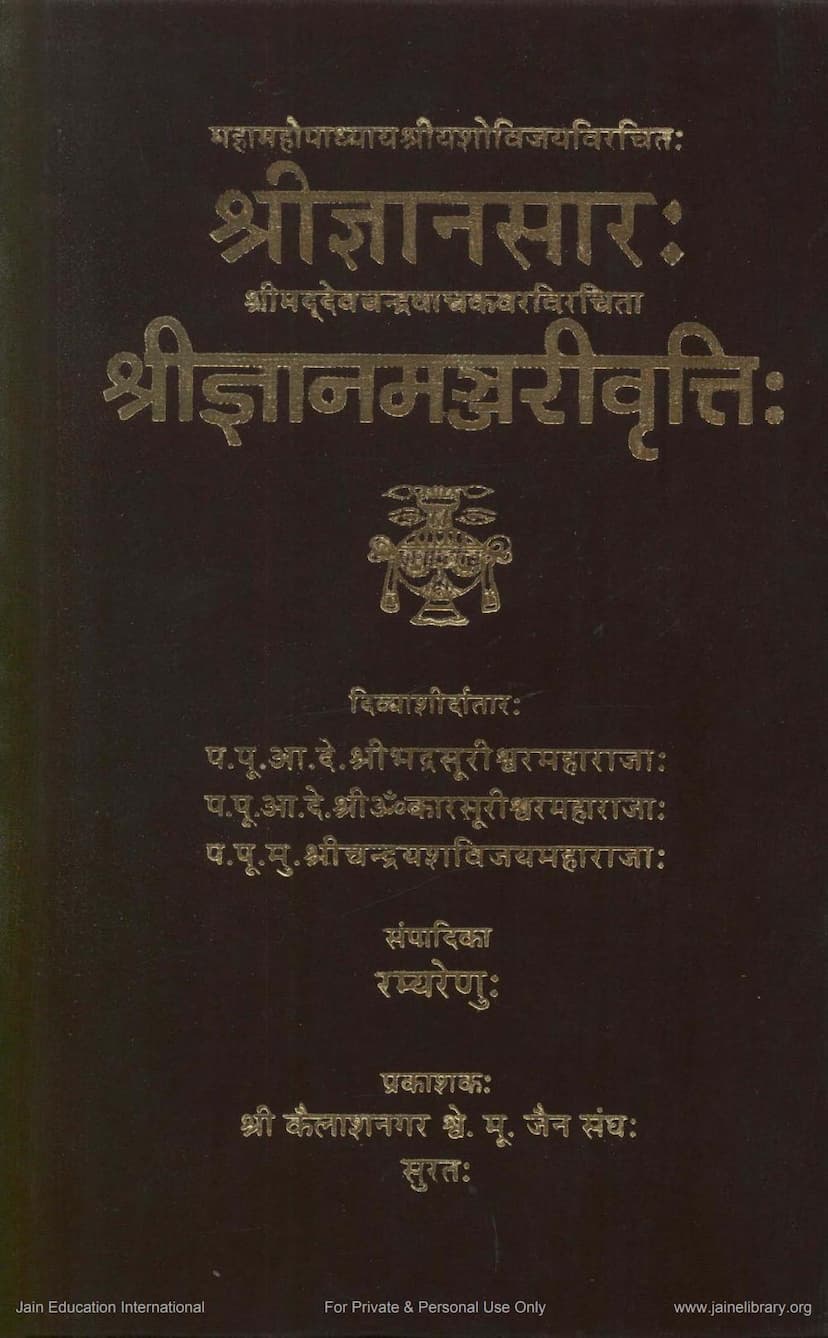Gyansara Gyanmanjarivrutti
Added to library: September 1, 2025

Summary
Based on the provided text, here's a comprehensive summary in English of the Jain text "Gyansara Gyanmanjarivrutti":
Title: Sri Gyansara (The Essence of Knowledge) Commentary: Sri Gyanmanjarivrutti (The Blooming Garland of Knowledge) Original Author of Gyansara: Mahamahopadhyaya Shri Yashovijayji Maharaj Author of Commentary: Shrimad Devchand Vasakvar Maharaj Editor: Ramyarenu Publisher: Shri Kailashnagar The. Mu. Jain Sangh, Surat
Overall Purpose and Content:
"Gyansara Gyanmanjarivrutti" is a significant Jain text that presents the profound spiritual philosophy of Jainism. The "Gyansara" by the renowned scholar Yashovijay Upadhyay outlines the core principles and spiritual path, while the "Gyanmanjari" by Devvachak Ramyarenu provides a detailed and insightful commentary. The publication, edited by Ramyarenu and published by the Kailashnagar Jain Sangh in Surat, aims to make these teachings accessible to a wider audience for personal and educational use.
Key Themes and Concepts:
The text delves into the essence of true knowledge ('Gyana') and the path to spiritual liberation ('Moksha'). It emphasizes:
-
The Nature of True Knowledge (Gyana): The commentary highlights Gyansara as a "ocean of nectar-like knowledge," a "treasure trove of knowledge," and a "master key" that unlocks the path to spiritual realization. It explains that true knowledge is not mere intellectual accumulation but an experiential understanding of reality that leads to self-realization and detachment from worldly affairs.
-
The "Essence" (Sara): The text traces the concept of "Sara" (essence) back to the teachings of the Tirthankaras, particularly referencing the "Loksara Adhyayana" of the Agamas. The commentary draws parallels between these ancient texts and Yashovijayji's work, demonstrating the continuity of Jain philosophical thought. The "essence" is understood as the fundamental truth and purpose of existence, ultimately leading to liberation.
-
Spiritual Practice and Sadhana: The book is deeply rooted in the principles of Jain spiritual practice. It discusses:
- Nishchaya (Ultimate Reality) vs. Vyavahar (Conventional Reality): Gyansara is presented as a guide that clarifies the "धारा" (stream) of Nishchaya (ultimate truth) that purifies Vyavahar (conventional dealings), guiding practitioners towards their true spiritual nature.
- The Eightfold Path: The commentary implies that the text is structured around key spiritual concepts, possibly corresponding to Ashtakas (eightfold structures), which are presented as tools for overcoming worldly errors and limitations.
- Attainment of Liberation (Moksha): The text details how studying and living by the principles of Gyansara leads to a life of spiritual discipline, self-mastery, and ultimately, liberation from the cycle of birth and death.
-
The Role of Teachers and Commentaries: The publication acknowledges the importance of spiritual guides and commentaries. The inclusion of the "Gyanmanjari" commentary by Devvachak Ramyarenu is crucial, as it elucidates the deeper spiritual essence of the original work. The text highlights how Devvachak, inspired by Yashovijayji's profound teachings, sought to share the "spiritual nectar" with others.
-
The Importance of Scriptural Study (Swadhyaya): The commentary stresses the continuous study and internalization of Gyansara, not just as a text but as a guide for living. The book is described as a companion that ensures sadhana progresses on the right path.
-
The Nature of the Universe and the Soul: The first verse of Gyansara is noted for its profound meaning, suggesting that the universe appears complete from the perspective of a fully enlightened soul, while its incompleteness is a reflection of our own limitations. This echoes the Upanishadic concept of "Purnam."
-
Reconciliation of Opposing Views: Yashovijayji, as noted in the commentary, is praised for his ability to synthesize and refine philosophical concepts, drawing out the "essence" from the teachings of earlier masters like Haribhadrasuri and Kundakundacharya, and skillfully integrating the principles of Nishchaya and Vyavahara.
-
The Depth and Complexity of the Text: The editor and contributors emphasize that understanding Gyansara, especially with the commentary, is not a superficial task. It requires significant preparation and deep study, as the text reveals subtle philosophical nuances and profound spiritual insights. The commentary itself is considered a "unique literary creation" and a source of spiritual nourishment.
-
Focus on Spiritual Purity and Detachment: The text guides readers towards a state of spiritual purity, self-awareness, and detachment from external possessions and affiliations. It emphasizes the journey of the soul from an outward-focused existence (Bahiratmā) to an inward-focused one (Antarātmā) and finally to a state of supreme realization (Paramātmā).
-
Preservation and Scholarship: The publication of this text is a testament to the dedication of scholars and organizations like the Kailashnagar Jain Sangh and the Vijay Charitable Trust in preserving and disseminating valuable Jain literature. The effort involved in researching various manuscripts and resolving textual discrepancies is highlighted, emphasizing the commitment to accuracy and authenticity.
In Essence:
"Gyansara Gyanmanjarivrutti" is more than just a philosophical treatise; it is a practical guide for spiritual aspirants. It offers a path towards understanding the true nature of reality, the self, and the universe, all through the lens of Jain philosophy. The combined wisdom of Yashovijay Upadhyay and Devvachak Ramyarenu, along with the dedication of the editor and publisher, makes this a valuable resource for anyone seeking deeper spiritual knowledge and practical guidance on the Jain path to liberation.